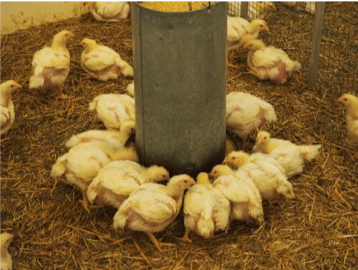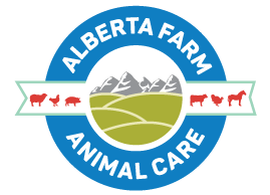Providing broilers with darkness improves production and alters behaviour and feed passage
By Tory Shynkaruk and Karen Schwean-Lardner, Department of Animal and Poultry Science, University of Saskatchewan
How we manage birds has a huge impact on their productivity, health, behaviour, and profitability. Lighting programs are an important management tool for poultry production. Traditionally, broiler chickens have been raised with little (1 hour) or no dark, with the belief this allowed them full visual access to their environment now know that birds need a period of darkness for optimal welfare and production. When birds are given a continuous period of 4-6 hours of darkness in a 24 hour period, they are more productive, healthier, more active, and sleep better.

The objective of this research was to understand the effects of different durations of darkness on broiler performance, feeding behaviour, and feed rates.
In this study we tested 4 different lighting programs: 23L:1D (23 hours light:1 hour dark), 20L:4D, 17L:7D, and 14L:10D. We found that birds reared on 4 and 7 hours of darkness had the highest body weights, and feed efficiency improved with more darkness.
Longer dark periods resulted in birds visiting the feeder more often and storing more feed in their crops. Birds given more than 4 h of dark increased their feeding and filled their crops within a few hours before lights turned off. This adaption, along with a slower feed passage rate during the dark, allowed birds to keep feed in their digestive tract for the entire dark period.
Longer dark periods resulted in heavier crop and gizzard weights, likely due to increased use. If feed stays in the crop and gizzard longer this could result in improved nutrient digestibility and feed efficiency. Gut health may also be improved by supporting growth of beneficial bacterial species and preventing growth of harmful species. This could be especially important in antibiotic free production systems.
In conclusion, our results indicte that broilers adapt to dark periods by altering their feeding behaviour, which in turn affects how their digestive tracts function. This may improve diet digestibility and gut health.

Tory Shynkaruk grew up in Kerrobert, SK and attended the University of Saskatchewan where she received her Bachelor and Masters degrees. She is currently working as a Research Assistant for Dr. Karen Schwean-Lardner in the Poultry Welfare and Management Lab at the U of S. This position has allowed Tory to gain experience working with broilers, turkeys, and laying hens and pullets. The research focus is on bird management, welfare, and behaviour.
This research was funded by the Natural Sciences and Engineering Research Council.
